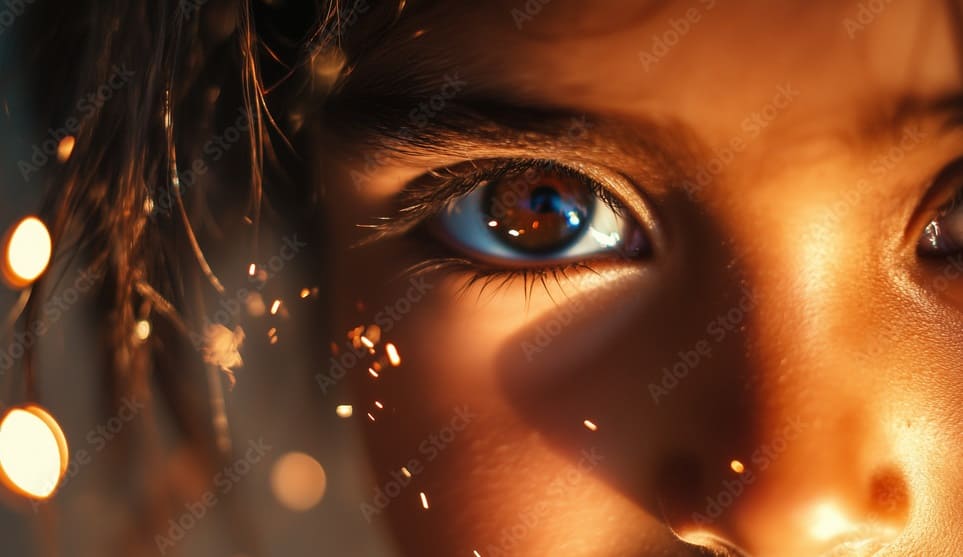Diwali is all about joy, lights, sweets, and those unforgettable family moments. For many kids, the most exciting part is burning crackers – the loud bangs, the colors lighting up the night sky. But as fun as it seems, we often overlook one important thing: how dangerous fireworks can be, especially for their eyes. As parents, we love to see our children happy, but their safety always comes first. And believe it or not, even the smallest sparkler can lead to serious eye injuries. So, before you hand your child that firecracker this Diwali, here’s what you need to know about how fireworks can harm their eyes and what you can do to keep them safe.
How Diwali Firecrackers Can Harm Your Child’s Eyes?
Fireworks, especially sparklers and rockets, can seem harmless, but they burn at extremely high temperatures, sometimes exceeding 1,200°C (2,192°F). That’s hot enough to cause severe damage to the eyes in an instant. Here are some common eye injuries associated with fireworks:
- Burns: Fireworks and sparklers release sparks that can easily fly into the eyes, causing burns to the delicate surface. Even a quick brush with a spark can leave the cornea (the outer layer of the eye) burned and in pain.
- Scratches (Corneal Abrasions): Pieces of debris from fireworks, like ash or tiny particles, can land in the eyes and cause painful scratches on the surface of the eye. This might lead to blurry vision, redness, or even infection.
- Chemical Burns: Did you know fireworks contain chemicals like phosphorus and sulfur? If these get into the eyes, they can cause chemical burns, which are extremely dangerous and need immediate treatment.
- Blunt Trauma: When a firework explodes, small parts can fly in all directions. If any of these hit the eye, it can cause blunt trauma, potentially leading to permanent damage or vision loss.
How to Protect Your Child’s Eyes from Firecrackers?
Now, I’m not saying you need to cancel all the fun. Diwali is meant to be celebrated! But with a few safety tips, you can make sure it’s a celebration without risks.
- Keep a Safe Distance: Make sure your kids stand far away when fireworks are being lit. Watching them from a distance is just as thrilling without the risk of injury.
- Protective Eyewear: This might not be the first thing that comes to mind, but protective glasses or goggles can be a game-changer. They provide an extra layer of safety while still letting your kids enjoy the festivities.
- Always Supervise: Kids often get caught up in the excitement and forget safety rules. Make sure there’s always an adult present to keep an eye on them and make sure they’re lighting fireworks safely.
- Avoid relighting dud fireworks: If a firework doesn’t go off, it might seem harmless, but these “duds” can still explode suddenly. Don’t let kids touch or try to relight them.
- Safer Alternatives: If you want to avoid fireworks altogether, there are plenty of safer alternatives like LED lights or sparkler-like glow sticks. They’re just as fun and festive!
What to Do in Case of an Eye Injury?
Accidents can happen, and if an eye injury does occur, here’s what you should do:
- Don’t Rub the Eyes: It’s instinctive, but rubbing can make things worse, especially if something’s stuck in the eye.
- Rinse the eyes: If any chemicals or debris get into the eyes, gently rinse with clean water for at least 15 minutes.
- Seek medical attention immediately: Even if the injury seems minor, it’s best to consult a doctor immediately. Eye injuries can lead to long-term problems if not treated properly.
Conclusion:
Diwali is a time to light up the night with joy, love, and laughter. But it’s also important to make sure your celebrations are safe. By taking a few simple precautions, you can protect your child’s eyes and ensure everyone enjoys the festival without any worries.
So this Diwali, let’s light up our homes and hearts with safety in mind. Your kids can still have a blast, but without the risk of damaging something as precious as their eyesight. After all, their happiness matters most—and so does their safety.
